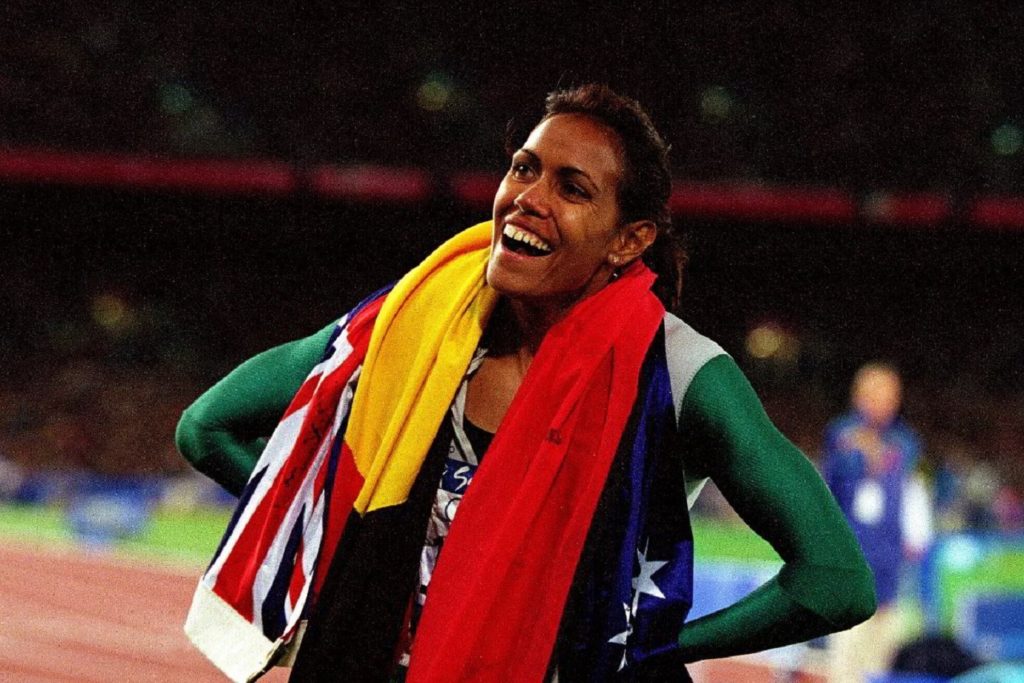Twenty years ago, Australia stood still to watch Cathy Freeman run 400m at the Olympic Games in Sydney.
The race happened so quickly, with Freeman winning gold with a time of 49.11 seconds, but she seemingly carried the weight of the country’s hopes and dreams over the finish line.
That’s how it’s captured in Freeman, a documentary that aired on the ABC on Sunday night. A normally private person, it marks the first time Cathy Freeman has shared her story, in her own words, with Australia and the world.
Combined with personal reflections from Cathy in the present day, the film follows her journey from childhood, to when she emerged as a talented athlete as a teenager, all the way up to her early days of competing at an elite level, then to the 2000 Olympics. Her family’s history is entwined throughout.
“I was a kid who was quite embarrassed to be a black kid, an Indigenous kid,” Freeman says in the film.
“I grew up with that self-image. I could never understand why I smiled at someone and they didn’t smile back. I would get really upset – why don’t you smile back? It used to devastate me.”
You couldn’t script the story and myth of @CathyFreeman into existence, and #FreemanABC – this unexpectedly beautiful marriage of dance, sport, history and politics – really does it justice. Goosebumps.
— Benjamin Law 羅旭能 (@mrbenjaminlaw) September 13, 2020
The film captures Freeman’s effortless charm and grace that she always managed to exude in the face of enormous pressure, and it follows her rivalry and friendship with French runner Marie-José Pérec.
Cathy Freeman’s rise to prominence as one of Australia’s best ever sportspeople, coincided with a time when Australia’s relationship with Aboriginal and Torres Strait Islander people was being brought to the fore in the public sphere.
After subjecting her and all Aboriginal people to lifelong racism, the whole nation watched on and looked to Cathy Freeman to bring us all together. What pressure. #FreemanABC
— PatriciaKarvelas (@PatsKarvelas) September 13, 2020
In 1996, she draped both the Aboriginal and Australian flags over her shoulders after winning at the Commonwealth Games. No athlete had ever done so before.
“I wanted to shout, ‘Look at me. Look at my skin, I am black and I am the best there is. No more shame’,” Freeman says of that moment.
In 2000, the federal government led by then Prime Minister John Howard,was refusing to apologise to the stolen generations. In a significant show of support for reconciliation, approximately 250,000 Australians marched across the Sydney Harbour Bridge in May that year. “Sorry” was written across the sky.
It wasn’t just a race. It wasn’t just a medal. She embodied and carried the story, hopes and dreams of so many of us.
— Banok Rind (@banoky) September 13, 2020
Tonight unlocked so many emotions and memories that I hadn’t felt in so long – I’ve still got goosebumps ❤️❤️❤️#FreemanABC
Never underestimate what Catherine meant and still does to our family, our mob, our community, our country. She made it possible for so many of us and will forever keep the flame lit ensuring the impossible becomes possible #CathyFreeman #ABC @NITV & this despite it all !! #2000 pic.twitter.com/aYtKesLDug
— Tanya Denning Orman (@TanyaDenning) September 13, 2020
The film follows as Freeman is selected to light the flame with the Olympic torch at the opening ceremony, and gives viewers a break down from her coach Peter Fortune, of the exact approach she would take for the 400m race.
It is up there with Australia’s proudest collective moments and Freeman shares that her ancestors were the ones that helped push her over the finish line.
“I feel like I am protected. My ancestors were the first to walk this land. It [is] a really powerful force.
“Those other girls were always going to have to come up against my ancestors.”
***
Love women’s sport? Sign up to our weekly update, The Sporty Wrap here.



